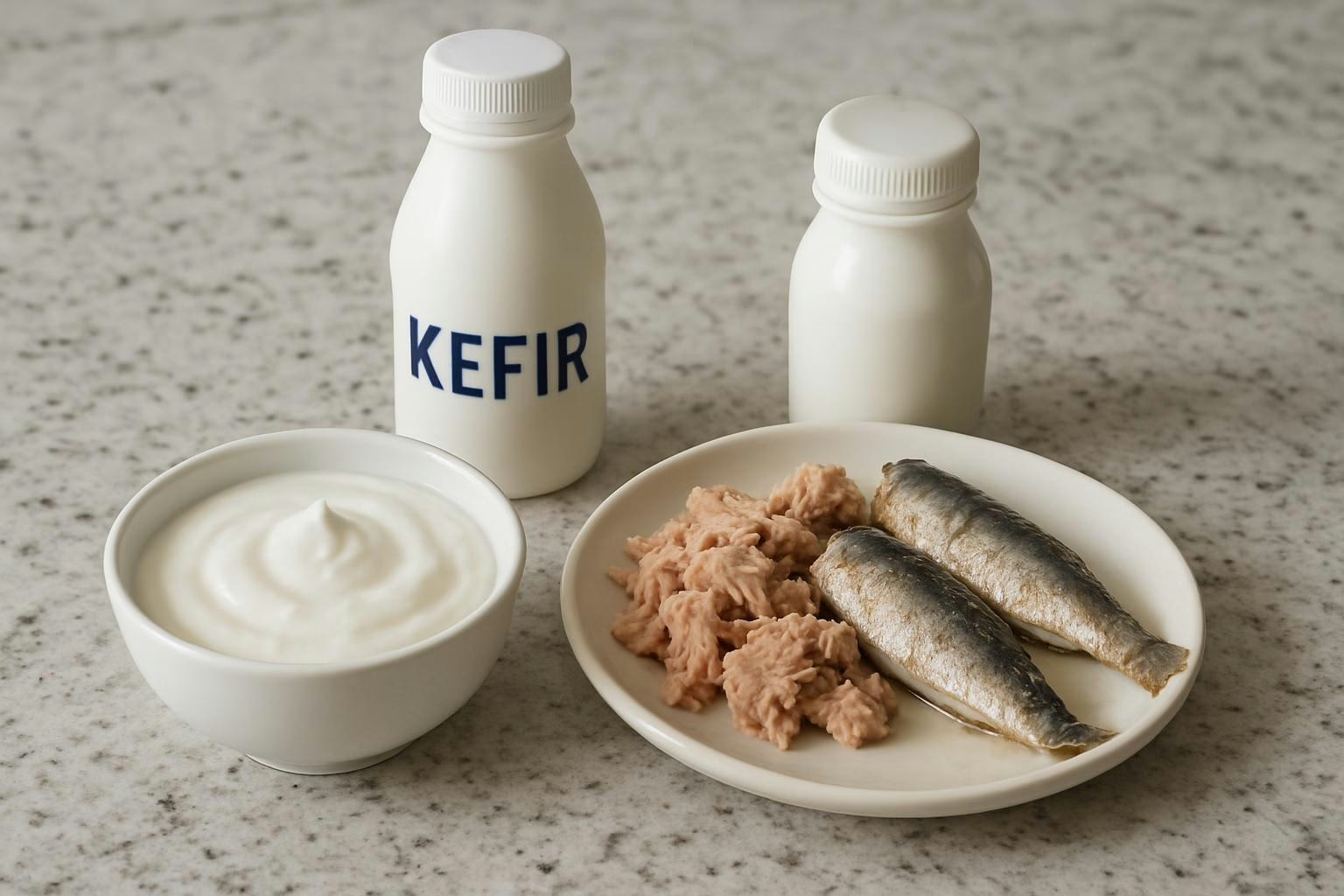
Health Benefits Of Phosphorus
There are many possible health benefits to be obtained from regularly maintaining optimal levels of phosphorus within the body.
Phosphorus is one of the most important nutrients for the body to be consuming daily and is the second most abundant mineral in the body. The phosphorus content of most supplements is very low and many westernized diets lack sufficient phosphorus. You could obtain more phosphorus in your diet through consuming foods such as sardines or tuna. There is also a high amount of phosphorus and calcium in yoghurts.
Phosphorus forms DNA which then helps to form all the proteins our cells. This includes the proteins which are needed to maintain cellular and tissue structures. Because of this a healthy phosphorus intake is a big influencing factor on cellular growth or maintenance. Phosphorus is possibly as important as dietary protein is in helping to support muscular development from athletic activity.
A healthy phosphorus intake may also have possible health benefits in helping to maintain and form new bone tissue. Our DNA and phosphorus rich bone tissues are both vital structural components of our bodies.
Here the many possible health benefits of phosphorus will be considered to show why this is a mineral you should be supporting your diet with daily.

How Much Phosphorus Should We Eat
The RDA for phosphorus is 1250mg a day for an average adult and child over the age of 4. Symptoms of a phosphorus deficiency are muscle weakness and bone diseases or pains.
Unknown to many people is a concern about the levels of phosphorus in our soils and availability of mineral phosphorus for fertilisers. Many westernized diets are also lacking or deficient in phosphorus. Supplements containing phosphorus or high amounts of bioavailable phosphorus are difficult to find and purchase. Supplements typically only contain about 10% or less of the phosphorus RDA. These are additional reasons to ensure that you are making sure you support a healthy intake of phosphorus with foods naturally rich in mineral phosphorus.
Plants contain phytate or phytic acid which are not as readily absorbed phosphorus forms. Plant phytic acid may also bind to other minerals which the body needs and limit their absorption. Animal products such as fish contain more bioavailable phosphorus on the whole.
Some food sources which are nutrient dense in bioavailable phosphorus include tuna and sardines with bones. 100 grams of bluefin tuna contains about 254mg of phosphorus while the same amount of sardines with bones contains 490mg of phosphorus. This is about 20% and 39% of your RDA for phosphorus.
Other foods rich in phosphorus are yoghurts and fermented yoghurts such as kefir. 100 grams of plain yoghurt contains around 95mg of phosphorus while the same amount of kefir contains about 100mg of phosphorus.

Why Is Phosphorus So Important
Mineral phosphorus forms one of the most important compounds for life on Earth known as DNA. Phosphorus is crucial to the structural formation of DNA. Our DNA contains a series of encoded cellular functions which then help to form our entire body structure. DNA is contained in the nucleus of cells and is used regularly to support their ongoing activities. This includes the formation of all the proteins we need to support our daily functioning.
Phosphorus is also an important part of phospholipids which form the surrounding membranes of cells. Phospholipids provide our cells with important structural support and form a barrier against external influences which could harm our cells.
In addition to this there are large stores of phosphorus in our bones and teeth. 85% of our total body phosphorus content is stored within our bones and teeth. Much of the rest of our body phosphorus is found in the blood and other tissues such as our muscles. Phosphorus forms a hard compound with calcium to support bone density called hydroxyapatite. This compound is also important in maintaining healthy or strong teeth into old age. Our bones are living tissues which need regular nutritional support. Eating sufficient phosphorus therefore has possible health benefits in maintaining strong bones and teeth.
Phosphorus forms a majority of three vital structural components of our cells and whole body and is therefore crucial for maintaining our overall structure. This is one of the most important reasons why maintaining a healthy intake of phosphorus is so important for our wellbeing.
Phosphorus And Athletic Performance
Bone mineral density is very important in high impact sports and for resistance to physical stress during intensive power sports. Athletic individuals tend to have higher bone densities than less athletic individuals. Another of the possible health benefits of phosphorus is in supporting athletic performance through an improved bone density.
Studies have shown that a higher intake of phosphorus may improve bone mineral density and that a higher bone mineral density supports some improvements in strength or athletic performance.
Phosphorus is also a major component of the molecule called ATP which we use as an energy source for all of our processes within the body. Higher levels of phosphorus could also support new mitochondrial production to further boost ATP or energy production capacity. The support of healthy energy levels is another possible health benefit of maintaining an optimal intake of dietary phosphorus.
Many studies have linked higher ATP and phosphorus levels with improvements in athletic performance. One study for example found that supporting ATP levels improved performance during lower body resistance exercise. ATP is thought to be preventative of skeletal muscle exhaustion. Other studies show that ATP improves muscle power and strength in trained athletes. Phosphorus may then also be supportive of athletic performance via optimal ATP levels within the muscles of the body.
The regular maintenance of healthy levels of phosphorus within the body or phosphorus loading is also associated with improved oxidative capacity and anaerobic threshold. Many studies have shown that sprint time may increase with an improved phosphorus intake. This may support performance during endurance exercise.

Phosphorus And Genetic Responsiveness
Phosphorus is an important part of our DNA which is needed to form our body proteins. This mineral therefore supports healthy growth and an ability to overcome physical or mental challenges. Without enough phosphorus your body would be unable to grow or properly support new muscle tissues.
Our DNA is also needed to make antioxidant proteins such as superoxide dismutase or glutathione peroxidase which are absolutely vital for our survival. Without these important antioxidant proteins our bodies would accumulate dangerous levels of oxidative stress and put the body under a lot of strain. High levels of oxidative stress are also linked to cancers and inflammatory diseases.
A healthy intake of phosphorus therefore also has possible health benefits in supporting the ability of our bodies to respond genetically to our environment or stresses we are under.
Phosphorus is very important for various core structural compounds of the body such as DNA or our bones. Overall the research suggests that maintaining an optimal intake of phosphorus could have possible health benefits for supporting muscle performance.

Summary
Various possible health benefits could be obtained from regularly maintaining optimal levels of phosphorus within the body.
Phosphorus dense foods you could eat to meet our 1250mg phosphorus RDA may include sardines or tuna. Certain yoghurts are also rich in phosphorus. Many supplements lack high amounts of phosphorus. We must therefore consume phosphorus in our diet to maintain optimal levels of phosphorus.
Phosphorus is the second most abundant mineral found in the body and one of the most important minerals too. Phosphorus is an essential component of our bones and DNA while phosphorus is also vital for forming cell membrane phospholipids. Around 85% of our total body phosphorus is found stored within our bones and teeth. This mineral is therefore of high importance in maintaining our overall body structure.
Maintaining a healthy intake of phosphorus contributes to maintain bone mineral density. A high bone mineral density supports athletic performance especially during intensive power sports. Phosphorus is a major component of ATP which our bodies use as an energy source. Many different studies have shown that higher ATP levels support athletic performance. This is especially the case during resistance exercise and healthy ATP levels may be preventative of fatigue.
A healthy intake of phosphorus also has possible health benefits in supporting the ability of our bodies to respond genetically to stresses we are under. This may include the production of proteins for our muscles during muscle growth or the formation of antioxidant proteins.
Overall the research shows that maintaining an optimal intake of phosphorus could have possible health benefits in supporting muscle performance and important body structures such as our bones.
For more interesting articles see the main articles page.





